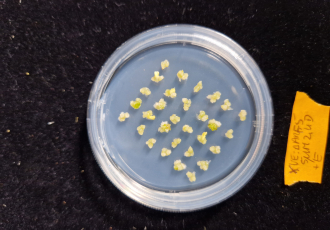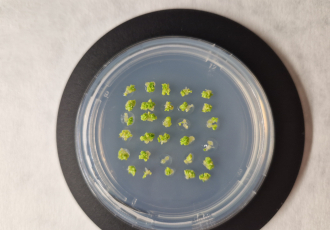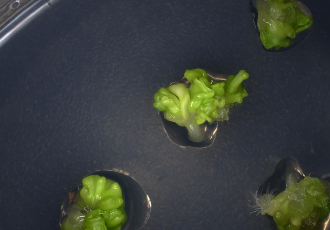24. Nov. 2025
Plants keep a kind of “backup plan” that allows them to grow a new organism from a single cell. Scientists from CEITEC Masaryk University discovered that this ability is controlled by an alternative form of one specific gene, which can make a single plant cell start growing into a whole new plant. The discovery may open the door to more efficient plant production and protection of endangered plant species.
Plants have an extraordinary ability to create an entirely new organism from a single cell that resets itself to a developmental state. This process, known as somatic embryogenesis, is used in laboratories to multiply plants, rescue endangered species, and develop new crops. However, the exact molecular signal that tells plant cells to return to their initial developmental stage has remained unclear.
The research team led by Hélène Robert Boisivon at CEITEC Masaryk University has now shown that this ability is linked to an alternative form of the MONOPTEROS gene, known as MP11ir. This gene produces a shortened version of the MONOPTEROS protein that can initiate the formation of small plant structures (called somatic embryos) that develop from ordinary cells rather than from seeds but acts independently of auxin, a hormone that is key in this developmental process. In other words, plants possess a built-in “backup mechanism” that enables them to start developing even when the primary hormonal pathway is disrupted.
“Our results show that plant cells are remarkably adaptable. Even when the main hormonal route fails, they can find another way to start development,” explains Samia Belaidi, first author of the study from the team of Hélène Robert Boisivon at CEITEC MUNI. “In animals, this could be compared to stem cells – basic cells from which the body can create almost any other type of cell, such as nerve, muscle, or skin cells. Plant cells have a similar capacity, but they use it naturally and very efficiently.”
Barbara Wójcikowska from the University of Silesia in Katowice, who contributed equally to the study as Samia Belaidi, adds: “Understanding how plant cells can ‘reset’ their identity helps us explore one of the most fundamental biological abilities – to start life again from a single cell. This insight is essential for both basic plant science and its practical applications.”
The researchers combined genetic methods, microscopy, and gene expression analysis in the model plant Arabidopsis thaliana. They found that both forms of the MONOPTEROS protein – the typical MP and its alternative version MP11ir – must work together for proper development of somatic embryos. When both MP and MP11ir are absent, the formation of somatic embryos is completely inhibited. When the amount of MP11ir is too high, the plant responds to hormonal signals, instead of forming new structures, it produces only undifferentiated tissue known as callus.
According to the researchers, this discovery could have practical applications in agriculture and conservation. A better understanding of how plant cells initiate developmental processes could improve laboratory propagation of crop species, enhance the success rate of cultivation in species that are difficult to grow, and contribute to the preservation of endangered plants.
“Our goal is to understand how plant cells decide their fate – whether a cell becomes a leaf or a root,” says Hélène Robert Boisivon. “This knowledge could one day support sustainable agriculture and biodiversity protection in a changing climate.”
The study was published in the journal Plant Physiology.


 Share
Share




